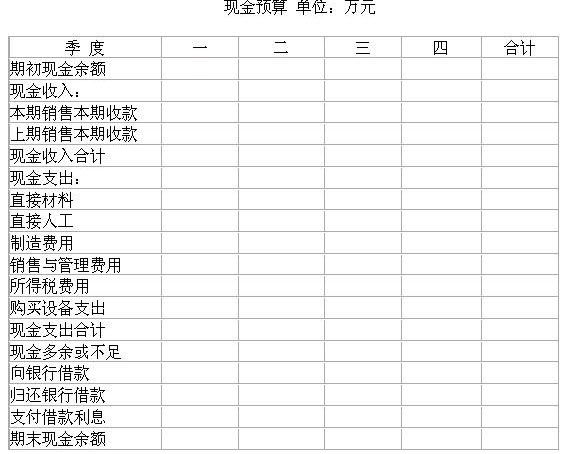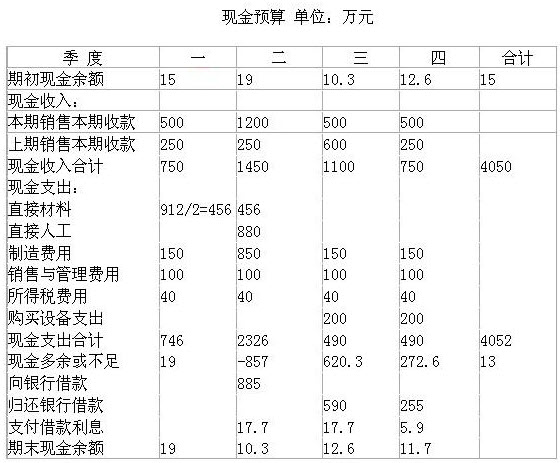(本小题8分。)甲公司是一个生产番茄酱的公司。该公司每年都要在12月份编制下一年度的分季度现金预算。有关资料如下:
(1)该公司只生产一种50千克桶装番茄酱。由于原料采购的季节性,只在第二季度进行生产,而销售全年都会发生。
(2)每季度的销售收入预计如下:第一季度750万元,第二季度1800万元,第三季度750万元,第四季度750万元。
(3)所有销售均为赊销。应收账款期初余额为250万元,预计可以在第一季度收回。每个季度的销售有2/3在本季度内收到现金,另外1/3于下一个季度收回。
(4)采购番茄原料预计支出912万元,第一季度需要预付50%,第二季度支付剩余的款项。
(5)直接人工费用预计发生880万元,于第二季度支付。
(6)付现的制造费用第二季度发生850万元,其他季度均发生150万元。付现制造费用均在发生的季度支付。
(7)每季度发生并支付销售和管理费用100万元。
(8)全年预计所得税160万元,分4个季度预交,每季度支付40万元。
(9)公司计划在下半年安装一条新的生产线,第三季度、第四季度各支付设备款200万元。
(10)期初现金余额为15万元,没有银行借款和其他负债。公司需要保留的最低现金余额为10万元。现金不足最低现金余额时需向银行借款,超过最低现金余额时需偿还借款,借款和还款数额均为5万元的倍数。借款年利率为8%,每季度支付一次利息,计算借款利息时,假定借款均在季度初发生,还款均在季度末发生。
要求:
请根据上述资料,为甲公司编制现金预算。编制结果填入下方给定的表格中,不必列出计算过程。

参考答案:

解析:
【解析】第一季度现金收入合计=年初的250+第一季度收入的2/3=250+750×2/3=750(万元)
第一季度期末现金余额=15+750-746=19(万元)
第二季度现金收入合计=1800×2/3+750×1/3=1450(万元)
第二季度现金余缺=19+1450-2326=-857(万元)
假设第二季度为A,则:-857+A-A×2%>10
解得:A>884.69
因为A必须是5万元的整数倍,所以A=885万元,即第二季度向银行借款885万元
第二季度支付借款利息=885×2%=17.70(万元)
第二季度期末现金余额=-857+885-17.7=10.30(万元)
第三季度现金收入合计=750×2/3+1800×1/3=1100(万元)
第三季度现金余缺=10.3+1100-490=620.3(万元)
假设第三季度还款为B,则:620.3-B-17.7>10
解得:B<592.6
由于B必须是5万元的整数,所以B=590万元,所以第三季度归还银行借款590万元
第三季度支付借款利息=885×2%=17.70(万元)
第三季度期末现金余额=620.3-590-17.7=12.60(万元)
第四季度现金收入合计=750×2/3+750×1/3=750(万元)
第四季度现金余缺=12.6+750-490=272.6(万元)
第四季度支付借款利息=(885-590)×2%=5.9(万元)
假设第四季度还款为C,则:272.6-C-5.9>10
解得:C<256.7
由于C必须是5万元的整数,所以C=255万元,所以第四季度归还银行借款255万元
第四季度支付借款利息5.90万元
第四季度期末现金余额=272.6-255-5.9=11.70(万元)
现金支出合计=746+2326+490+490=4052(万元)
现金多余或不足=15+4050-4052=13(万元)
